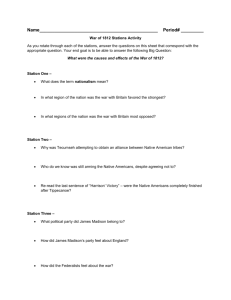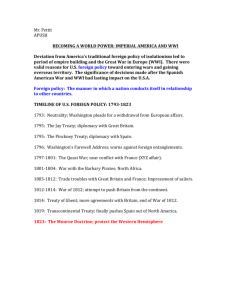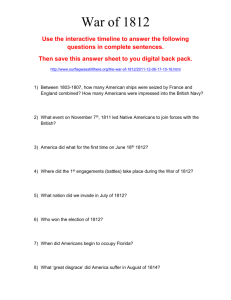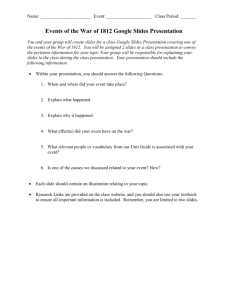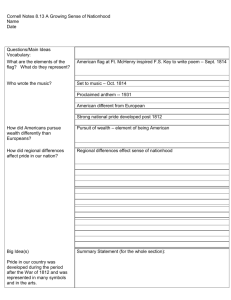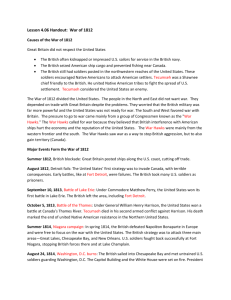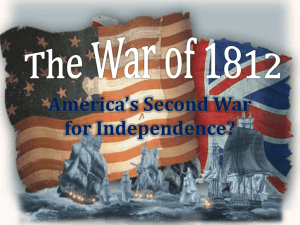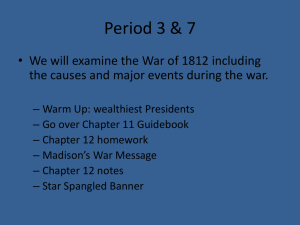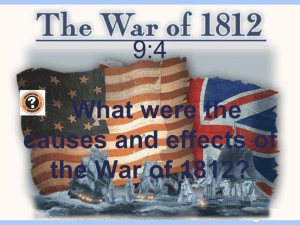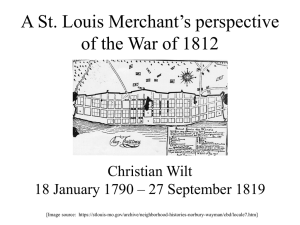The War of 1812
advertisement
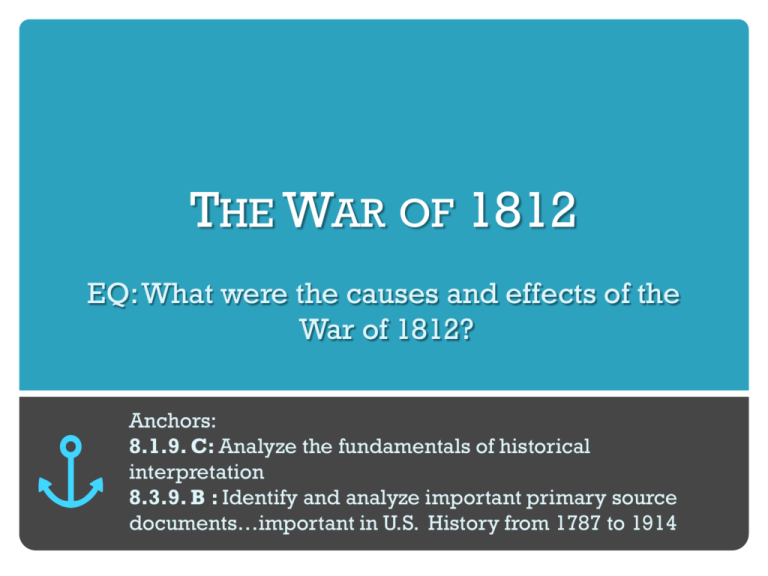
THE WAR OF 1812 EQ: What were the causes and effects of the War of 1812? Anchors: 8.1.9. C: Analyze the fundamentals of historical interpretation 8.3.9. B : Identify and analyze important primary source documents…important in U.S. History from 1787 to 1914 Causes of the War of 1812 1. Please read James Madison’s (he was President at the time) war message to Congress 2. Underline or the reasons Madison gives for wanting to go to war. 3. Minute Spit-It 4. Record what your group came up with Reasons for Going to War •British cruisers continued to practice the violation of the American flag, seizing & carrying off persons sailing under it. •Hover over and harass our entering and departing commerce. • Great staples of our country have been cut! • Avowed a determination to persist in them against the US until the markets of her enemy are open to British • Drawn to the warfare just renewed by the savages. Other Reasons for Going to War Nationalism Pride in one’s country Belief that our country is better than everyone else’s Other Reasons for Going to War War Hawks People such as Henry Clay and John C. Calhoun who agitated for war with Britain In June 1812, the U.S. Declared War on Britain The U.S. finds itself unprepared!! Because of Jefferson’s earlier cuts of the government, the U.S. very weak 16 warships and 7,000 soldiers (Britain had over 200 warships) The British are still in a war!! The British had to fight the War of 1812 and the Napoleonic Wars at the same time The Tactics of Both Sides The U.S. Invade British Territory in Canada Gain control of the Great Lakes and keep control of the Mississippi The British Blockade all U.S. ports to prevent supplies Enlist the help of the Native Americans Bell Ringer 1. What were 3 causes of the War of 1812? 2. Who were the two most famous war hawks? 3. Who was president during the War of 1812? 4. Why was the U.S. unprepared for war? 5. What was the British strategy for the war? The Invasion of Canada Fort Detroit Attempted to invade Canada through Detroit General William Hull began to retreat and was quickly surrounded by British soldiers andNative American warriors This was a huge defeat for the U.S.-British captured over 2,000 soldiers The Invasion of Canada Lake Erie Commander Oliver Hazard Perry led huge victory British were forced to return to retreat to Canada First time in history that an entire British Fleet was defeated and captured by the enemy The Invasion of Canada Thames As British and Native American allies retreated, General William Henry Harrison and his troops pursued them Followed British into Canada and defeated them Conflict in the South Horseshoe Bend Andrew Jackson in command of U.S. forces in Georgia Creek tribes had attacked American settlements Jackson defeated them at Horseshoe Bend and forced them to give up millions of acres of land Final Battles Washington In 1814, the British defeated Napoleon and could bring all their troops to the U.S. Set fire to many government buildings including the White House Final Battles Fort McHenry British attacked fort which defended Baltimore’s harbor British warships bombarded the fort throughout the night but, American fought off the attack Oh, say can you see by the dawn's early light What so proudly we hailed at the twilight's last gleaming? Whose broad stripes and bright stars thru the perilous fight, O'er the ramparts we watched were so gallantly streaming? And the rocket's red glare, the bombs bursting in air, Gave proof through the night that our flag was still there. Oh, say does that star-spangled banner yet wave O'er the land of the free and the home of the brave? Battle of Fort McHenry, 1814 Oh Say Can You See By the Dawn’s Early Light… -- Francis Scott Key Gave proof through the night, That our flag was still there… The End of the War Treaty of Ghent The war was a draw, Britain tired of fighting: too costly On Dec. 24, 1814 agreed to Treaty of Ghent Agreed to go back to the ways things were before the war Britain never gave the Native Americans the land they had promised The issue of impressment was never mentioned in the treaty War helped U.S. gain respect as a nation, called “Second War for Independence” People that Didn’t Get the Message The Hartford Convention There was much opposition to the war Federalist critics called it “Mr. Madison’s War” New Englanders especially, were against the war because the naval blockade had hurt trade December 1814, a group of Federalists met in Hartford, CT People that Didn’t Get the Message The Hartford Convention Some delegates at the Hartford Convention suggested seccession from the U.S. When news of peace arrived at the convention the convention quickly ended People that Didn’t Get the Message The Battle of New Orleans General Andrew Jackson did not get the news of the Treaty Fought and won stunning victory at New Orleans
